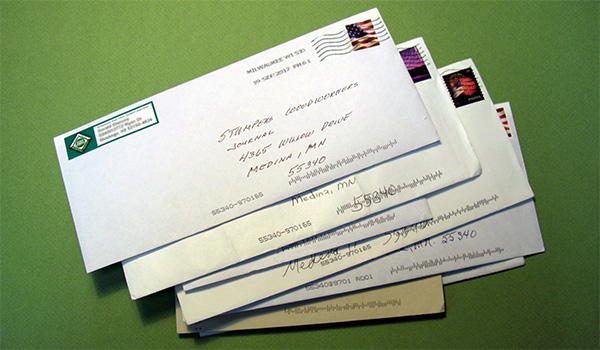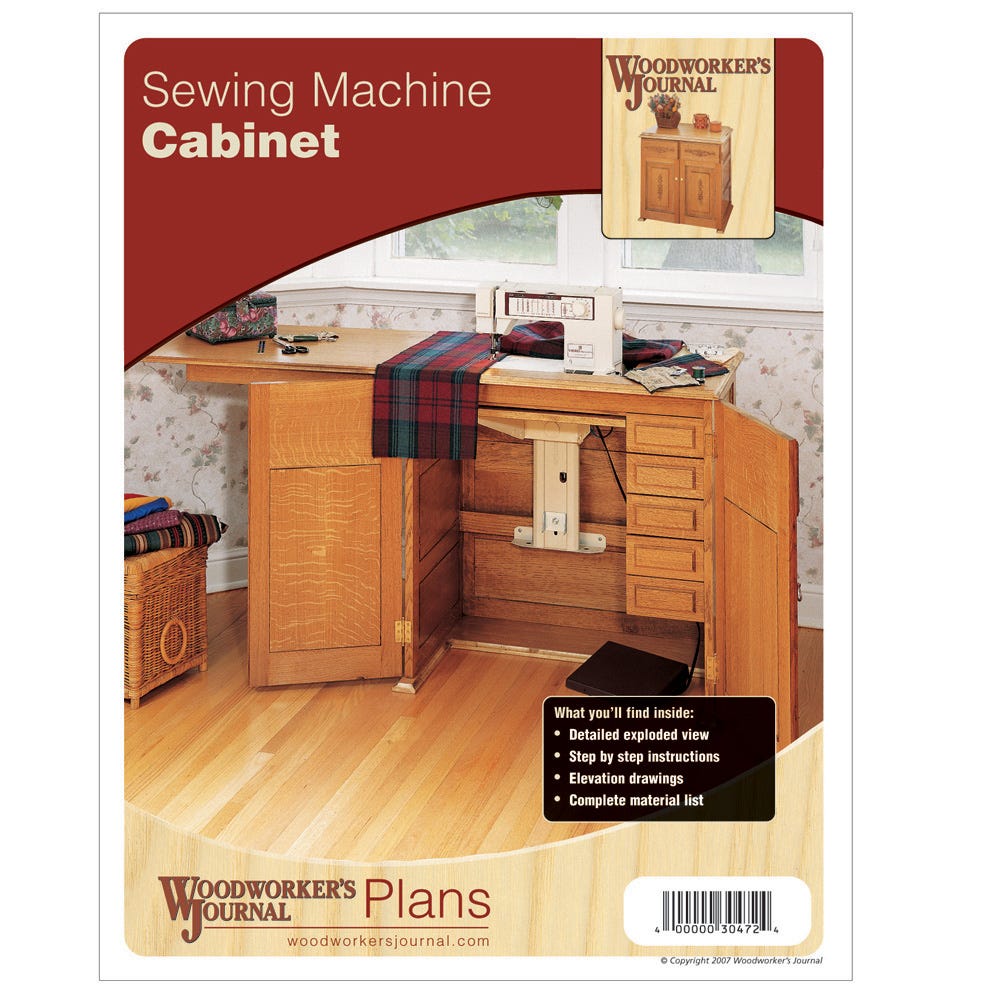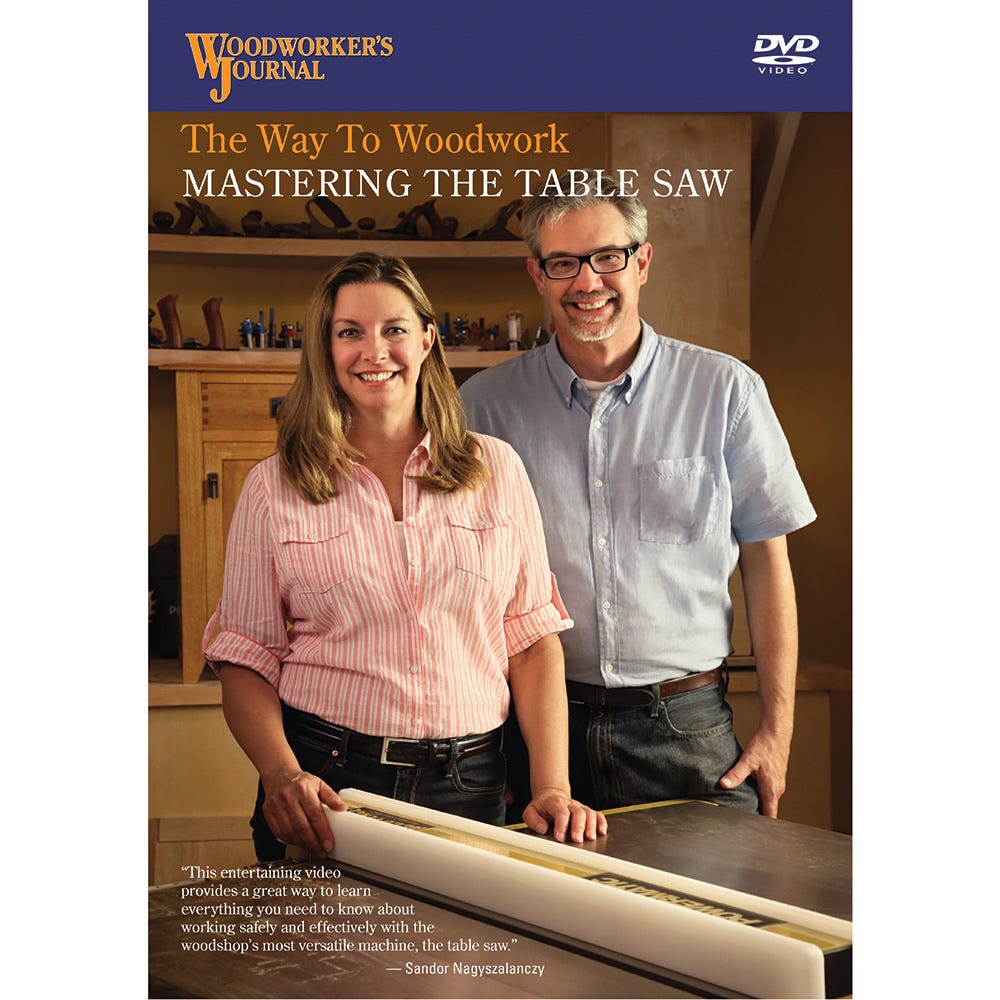
Work Sharp
“Thanks for your write-up. I found the Work Sharp to be a great sharpener. Never have I sharpened so many chisels in so short a time and enjoyed it so much. Unbelievable.” – Bill Ottoson
Janet Collins
“I was very happy to see your beautiful furniture in the Woodworker’s Journal. It is nice to know that more women are getting involved in making furniture.” – Shane Stute
Cinderella
Can you bear one more entry on the cinder block issue if we promise to throw in a bit of history as well? – Editor
“Cinder block was manufactured as a lightweight block. The modern replacement is a lightweight block using haydite aggregate. They are still made today and are used in non-load-bearing applications where weight is an issue.” – Fred Kalvelage
Fred’s comments piqued our curiosity about haydite. Here’s what we discovered at the haydite home page. Early in the 20th century, Stephen Hayde invented and patented a method for making a structural grade lightweight aggregate, and named the product after himself. Although the original patents have long since expired, the term ‘Haydite’ is used by several companies in marketing their expanded shale lightweight aggregate. – Editor
Cutting Remarks
In the last issue, we asked you woodworkers whether you were loyal to wood cutting boards or partial to plastic. In some homes, it seems the dishwasher influences the decision. – Editor
“When it comes to cutting boards, I have succumbed to the Dark Side and strictly use the plastic variety. That’s because we can put the plastic ones in the dishwasher and get them really clean. I have made several wooden ones, but my lovely wife leaves them on display in the kitchen.” – Greg Smith
“A plastic cutting board can go into the dishwasher. This makes it perfect for using to cut up raw meat and poultry. I use wood cutting boards for fruits and veggies.” – Roberta Moreton
“I really like wood, but plastic can be routinely run through the dishwasher to be sanitized, or treated with bleach, something I wouldn’t want to happen to a nice wooden one.” – Patrick Greenlee
Others had different reasons for their preferences. – Editor
“I use both. I have a few wooden boards and one plastic board. I use the wood boards for practically everything except three items: garlic, hot peppers and fish. I use one side of the plastic cutting board for fish, and the other for garlic and peppers.” – Michael Gaule
“I have both. I use both. I tend to use the plastic one for meats and the wooden ones for veggies, but it really depends on what I’m cutting, what I’m cutting it with, and how much working area I need. My largest happens to be plastic.” – Joe Kesselman
“I use a plastic cutting board because it came with my wife when we got married, and I haven’t gotten around to making a wood board.” – Barry Saltsberg
“I work in wood, but I confess that I use plastic cutting boards in the kitchen. As for wooden cutting boards, I would use wood cutting boards if my family wouldn’t leave them in the sink to warp. If you publish this, please don’t sign my real name. I don’t like sleeping with the dogs. Sign me…” – Banjoguy
Fair enough, Banjoguy. You were honorable enough to include your real name, so we will be honorable enough not to put you in hot water (along with your cutting boards.) Of course, there are some wood loyalists, though fewer than we expected. – Editor
“I’m very loyal to my wooden cutting board. It was made by my cabinetmaker grandfather out of a piece of 5/4 beech at least 60 years ago. My grandmother put it to work, and I’ve had it for the past 25 years. It’s now about an inch thick, and I suspect it’ll be useless about a hundred years from now.” – Ed Kern
“I don’t think that there is one of us old meat cutters out there that wouldn’t be elated to go back to wood cutting blocks. The main reason: our knives lasted longer, and we didn’t have to take them to the stone nearly as often. We cleaned them with soapy water and a bristle brush, then rinsed with bleach-laden water. From time to time, we’d wet them and leave a coat of salt overnight to really whiten them up. Also, meat didn’t slide around as much.” – Ken Browning
This sad tale came from a well-meaning woodworker who made cutting boards only to have them revered instead of used. – Editor
“I made my first laminated cutting board for my mom in 1971. It has been used virtually every day since and it is still going strong, so I thought it would make a nice and simple gift for all my cousins one Christmas. They all loved them, but not a one will use it as a cutting board. They all feel they are too beautiful to use every day and only put them out as centerpieces at parties and family gatherings.” – Mark Huey
Our favorite response, though, came from this waggish wood fancier. – Editor
“I use a number of plastic cutting boards. In fact, last week I found a nice one for sale, took it home, and made three table saw inserts out of it.” – Skip Fowler
Small But Not Offensive
“How can there be any sin in sincere…” begins a song crooned by the Buffalo Bills in Meredith Willson’s “The Music Man.” It’s an appropriate reminder that just because a word sounds like another, or even contains elements of another word, does not mean the definition is the same. This letter came in response to last issue’s WebSurfer’s Review in which someone posted the comment “…being niggardly is not being a friend.” – Editor
“I cannot believe you printed this quote with such an offensive word! While it may be a part of the vernacular in some cultural settings, I do not believe it is appropriately used here or anywhere else. Shame!” – Bill Sell
Bill, you are obviously thinking of a different word.
The American Heritage® Dictionary of the English Language: Fourth Edition. 2000
Even the origins of the two words are entirely different, as is explained by Anu Garg, word maven of A Word A Day. “Niggard, of which niggardly is the adverb form, is of Scandinavian origin and has an entirely different etymology. The only thing the two words have in common is a few letters.” – Editor
“I would not have posted the comment due to the use of the word niggardly. I understand that it is not a slang word, but it is commonly taken to be one.” – Sam Brooks
If we were to abandon any word that someone misunderstands or is not familiar with, our language would devolve into a pale imitation of its present colorful pastiche. One could also argue that perhaps the best way to prevent a word from becoming misunderstood is to use it regularly and correctly. – Editor
Don’t Forget to Floss
“In Issue 175, a question was asked how to separate two pieces of wood that were held together by means of two-sided tape. Mineral spirits helps, but dental floss, worked back and forth between the two pieces of wood just as you would if flossing teeth acts as a cutting or slicing mechanism that will separate the adhesive.” – Andy Conner
Typo Corner
Here’s where we chuckle over our ability to quickly hit the wrong keys when typing. It’s easy to see how that happened in this example, which boasts not only two different incorrect spellings of odor, but also a substitution for the word “neutralize.” – Editor
“The cupboards have an awful order like dirty feet. How can we naturalize this ordor?”
We suppose you could ‘order’ it to leave until it has a chance to apply for citizenship. – Editor







